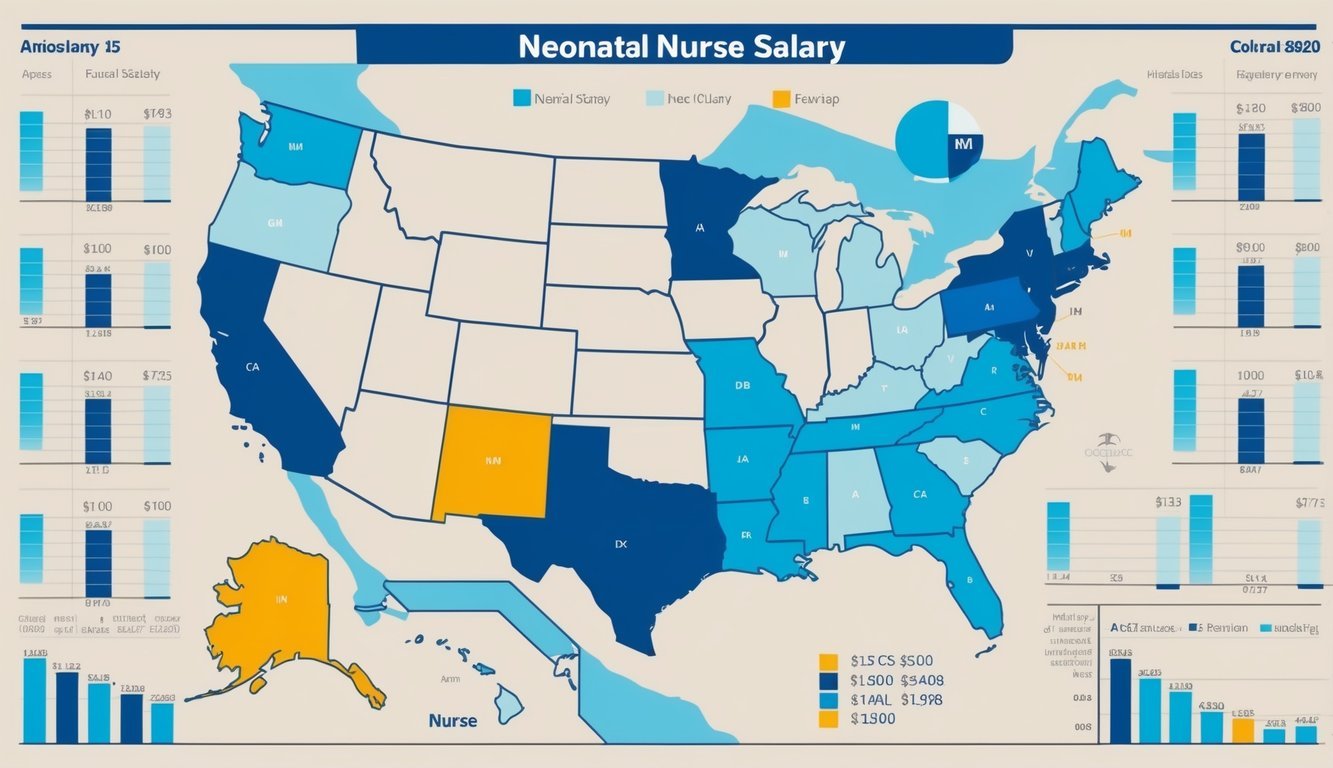As a neonatal nurse, you play a crucial role in caring for some of the most vulnerable patients—newborns with complex medical needs.
Your responsibilities include monitoring vital signs, administering medications, and providing support to families during challenging times. In 2024, average salaries for neonatal nurses range from around $65,000 to $100,000 annually, depending on experience and location.
Understanding the salary landscape for neonatal nursing can help you make informed career decisions.
Factors like education, certifications, and regional demand can all affect your earning potential.
The job outlook for neonatal nurses is strong, with many opportunities for professional growth and advancement in this rewarding field.
Key Takeaways
- Salaries for neonatal nurses vary based on experience and region.
- There is a strong demand for neonatal nurses in the healthcare field.
- Continuing education can enhance your career and salary prospects.
Neonatal Nurse Role and Work Environment

Neonatal nurses play a crucial role in caring for vulnerable newborns, often in high-stress environments.
Understanding their specific duties, the settings they work in, and the levels of care available is essential for anyone interested in this specialty.
Overview of Neonatal Nursing
Neonatal nursing focuses on caring for newborns, especially those born prematurely or with health issues.
Your responsibilities include monitoring vital signs, administering medications, and providing support to families.
You will work closely with physicians and other healthcare professionals to develop care plans.
This collaboration ensures infants receive comprehensive support tailored to their needs.
Additionally, you will educate parents on infant care and the medical conditions affecting their babies.
The Neonatal Intensive Care Unit (NICU)
Most neonatal nurses work in the Neonatal Intensive Care Unit (NICU).
This specialized department is equipped to handle critical cases, providing advanced medical care.
In a NICU, equipment like incubators and ventilators is common.
The environment can be intense as you care for infants who need constant monitoring.
Teamwork is vital, and you will often engage with a multidisciplinary team, including doctors, respiratory therapists, and social workers.
The emotional support you provide to families is just as important as the medical care.
You help them navigate the challenges of having a newborn in critical condition.
Levels of Neonatal Care
Neonatal care is categorized into levels based on the complexity of the situation.
Here’s a breakdown:
| Level | Description |
|---|---|
| Level I | Basic care for healthy newborns. |
| Level II | Care for infants needing special monitoring but not critically ill. |
| Level III | Advanced care for critically ill newborns, including those requiring surgery. |
As a neonatal nurse, you may work in a Level III NICU, where you provide intensive care for the most vulnerable infants.
This setting requires advanced skills and knowledge to manage complex medical situations effectively.
To explore more about neonatal nursing, visit NursingProcess.org for a detailed overview and salary information.
Education and Certification Requirements

To become a neonatal nurse, you must complete specific educational qualifications and certifications.
Understanding these requirements helps you plan your career path effectively.
Necessary Nursing Degrees
To start your journey as a neonatal nurse, you need a nursing degree.
You can choose between an Associate Degree in Nursing (ADN) or a Bachelor of Science in Nursing (BSN).
While an ADN typically takes two years, a BSN takes about four years to complete.
Having a BSN is increasingly preferred by employers and can lead to better job opportunities.
After obtaining your degree, you must pass the National Council Licensure Examination (NCLEX-RN) to obtain your registered nurse (RN) designation.
| Degree Type | Duration | Key Benefits |
|---|---|---|
| ADN | 2 years | Quick entry into the nursing field |
| BSN | 4 years | More job opportunities and higher pay |
Advanced Degrees and Specializations
To further enhance your qualifications, you may consider pursuing advanced degrees.
A Master of Science in Nursing (MSN) allows you to specialize in areas like neonatal nursing.
Moreover, obtaining a Doctor of Nursing Practice (DNP) can prepare you for leadership roles in neonatal care.
Other advantages of higher education include understanding complex healthcare issues and better patient management skills, which are crucial for providing specialized care in a Neonatal Intensive Care Unit (NICU).
Certification for Neonatal Nurses
After earning your nursing degree, you can pursue certification specific to neonatal nursing.
The RNC Certification for Neonatal Intensive Care Nursing (RNC-NIC) demonstrates your expertise and commitment to the field.
This certification requires you to meet certain eligibility requirements, including a combination of clinical experience and education.
Regular certification renewal is also essential to stay current in your qualifications.
Having the RNC-NIC certification can significantly enhance your job prospects and may lead to higher salaries as well.
Investing in your education and certifications can yield a rewarding career in neonatal nursing.
Neonatal Nurse Salaries
Understanding neonatal nurse salaries involves looking at the average pay, variations by state, the highest-paying states, and comparisons with related nursing roles.
This information helps you grasp how different factors can impact your earning potential in this specialized field.
Average Salary and Influencing Factors
The average salary for neonatal nurses can vary based on several key factors.
As of 2024, the average annual salary is approximately $127,391 according to ZipRecruiter.
The hourly rate generally falls around $61.
Experience, education level, and specific job duties influence salaries.
For instance, neonatal nurse practitioners (NNPs) typically earn more due to advanced responsibilities and training.
Additionally, the cost of living in your area affects how far your salary goes.
Cities with higher living expenses usually pay more.
Salary Variations by State
Salaries for neonatal nurses vary significantly across the United States.
Below are average annual salaries for neonatal nurses in select states:
| State | Average Annual Salary |
|---|---|
| Minnesota | $112,100 |
| Mississippi | $85,700 |
| California | $150,000 |
| Texas | $97,000 |
These figures reflect how local demand and cost of living can impact nurse salaries.
In states like California, the average pay is higher due to a greater demand for healthcare services and a higher cost of living.
Highest-Paying States for Neonatal Nurses
When looking for the best-paying opportunities, focus on the states that offer higher salaries.
States such as California, New York, and Texas are often at the top.
Here are some highlights:
- California: Often cited as one of the highest-paying states with salaries around $150,000.
- New York: Offers competitive salaries, frequently exceeding $135,000.
- Texas: Provides substantial opportunities with an average of $97,000 annually.
These states not only provide higher salaries, but may also offer various employment benefits that can further enhance total compensation.
Comparing Salaries of Related Nursing Roles
To understand where neonatal nursing stands, it’s useful to compare it with other nursing roles.
Here’s a quick overview:
| Role | Average Salary |
|---|---|
| Neonatal Nurse | $127,391 |
| Nurse Practitioner | $114,000 |
| OB/GYN Nurse | $65,400 |
Neonatal nurses earn more than traditional nurse roles like OB/GYN nurses.
This reflects the complexity and high level of care required in neonatal settings.
Understanding these comparisons helps you evaluate your career choices effectively.
Job Outlook and Professional Development
The job outlook for neonatal nurses is positive, with growing demand in hospitals and clinics.
As a vital part of healthcare, there are also numerous opportunities for professional development to advance your career.
Current Demand and Future Projections
Neonatal nurses are in high demand, especially in specialized areas like neonatal intensive care units (NICUs).
The job growth rate for neonatal nursing is projected to be around 6% from 2018 to 2028.
This growth is driven by an increase in premature births and advancements in neonatal care.
Many states offer competitive salaries for neonatal nurses.
Here’s a quick view of average salaries in select states:
| State | Annual Salary |
|---|---|
| Minnesota | $112,100 |
| Mississippi | $85,700 |
| District of Columbia | $101,174 |
The need for skilled nurses will likely continue to rise, meaning job security and opportunities for employment remain strong.
Opportunities for Advancement
As a neonatal nurse, you can pursue various paths for professional development.
Education plays a key role in advancing your career.
Many neonatal nurses choose to become neonatal nurse practitioners (NNPs) or pursue specializations in areas like congenital heart disease or neonatal surgery.
You can enhance your skills through continuing education programs and certifications.
Organizations like the National Association of Neonatal Nurses (NANN) offer valuable resources for advanced training.
Consider joining professional networks and attending conferences.
These can provide not only education but also connections that may lead to job opportunities.
You have the chance to grow in your field and take on leadership roles within healthcare settings.
Understanding Regional Differences

Salaries for neonatal nurses can differ significantly based on location.
Factors such as state demand, hospital settings, and local cost of living play a crucial role in determining wages.
Here’s a closer look at specific states and how these elements impact salaries.
Salaries in California
In California, neonatal nurses earn some of the highest salaries in the country.
According to the Bureau of Labor Statistics, the average annual salary for neonatal nurses in California can reach approximately $93,014.
| Position | Average Salary |
|---|---|
| Neonatal Nurse | $93,014 |
| Neonatal Nurse Practitioner | Starting at $108,000 |
This high pay reflects the state’s cost of living, which is substantially above the national average.
Major cities like Los Angeles and San Francisco also have a high demand for nurses, especially in Neonatal Intensive Care Units (NICUs).
The Cost of Living Impact
The cost of living varies widely across the United States, influencing take-home pay for neonatal nurses.
In high-cost areas, such as California, salaries need to support housing, groceries, and other essentials.
For example:
- California: High housing costs can consume a major portion of a nurse’s salary.
- Missouri: Generally, living expenses are lower, which allows for more flexibility in budgeting.
Understanding these differences can help you make informed decisions about where to work.
Lower salaries in states with cheaper living costs may still provide a comparable standard of living.
A Closer Look at Missouri
In contrast to California, neonatal nurses in Missouri have different salary expectations.
The average salary for neonatal nurses in Missouri is about $68,000 per year, which reflects a lower cost of living.
| State | Average Annual Salary |
|---|---|
| Missouri | $68,000 |
| California | $93,014 |
The salary is less, but living costs in Missouri are much more manageable.
You may find reasonable housing and everyday expenses, which can enhance your quality of life.
Evaluating both salary and cost of living will help you determine the best place for your career.
These regional differences showcase the importance of weighing salary against living conditions for neonatal nurses.
Frequently Asked Questions

In this section, you will find specific details about neonatal nurse salaries, touching on typical pay ranges, factors that influence earnings, and required qualifications.
Understanding these aspects can help you better navigate a career in this important nursing specialty.
What is the typical salary range for a neonatal nurse?
The typical salary for neonatal nurses varies widely.
Generally, you can expect to earn between $60,000 and $112,000 annually, depending on location and experience level.
States like Minnesota offer higher average salaries, often exceeding $112,100 per year.
How does the salary of a neonatal nurse vary by experience level?
Your experience significantly impacts your salary as a neonatal nurse.
Entry-level nurses may start with an average salary around $60,750, while experienced nurses can earn upwards of $101,760 per year.
This increase often occurs as you gain specialized skills and certifications.
What are the factors that influence the salary of a neonatal nurse in different states?
Several factors affect neonatal nurse salaries across states.
These include the cost of living, demand for neonatal care, and local hospital pay scales.
For instance, nurses in large urban areas might earn more due to higher living costs and greater demand.
What qualifications are required to become a neonatal nurse?
To become a neonatal nurse, you typically need a Bachelor’s degree in Nursing (BSN) and a registered nurse (RN) license.
Many employers prefer nurses with additional certifications in neonatal care, which can enhance your skills and boost your salary potential.
What is the average hourly wage for neonatal nurses?
The average hourly wage for neonatal nurses ranges from $30 to $55, depending on experience, location, and the healthcare facility.
For example, in Michigan, the average rate is around $48.92 per hour.
How do neonatal nurse salaries compare to other specialized nursing professions?
Neonatal nurses generally earn competitive salaries compared to other nursing specialties.
They often earn more than pediatric nurses but may earn less than nurse anesthetists or nurse practitioners.
Nurse anesthetists and nurse practitioners usually have advanced degrees and higher responsibilities.
For specific figures, you can visit resources like NurseJournal.

